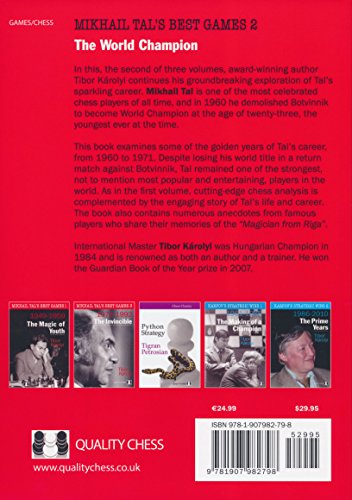


The World Champion: Mikhail Tal's Best Games 2
M**0
opens with great coverage of Tal's career peak moment when he solidly ...
Volume 2 of Karolyi's Tal opus, opens with great coverage of Tal's career peak moment when he solidly beats Botvinnik for the world title. From here Tal's story-arc dramatically changes. His always compromised physical health collapses over chronic kidney failure; made worse by a lifestyle of incessant smoking, lots of alcohol and late nights of chess. In his private life there is a marriage, a divorce, possible relationships and finally a successful marriage, which Karolyi assures will lead Tal to a better things in the 1970's. Tal remained an elite player through-out the 1960's. After illness and losing in ugly fashion in the 1961world title rematch, there are several good results: 1st at Bled 1961's strongest event, good USSR ch results (couple of 2nds & 1st 1967), 1st= at Amsterdam Interzonal (with Spassky,Larsen, & Smyslov), beating Portisch & Larsen in '65 Candidates matches & Gligorich in '68, 1st Palma '67, and some awesome scores at chess Olympiads. As we expected with a Karolyi -book there is: outstanding analysis, a detailed life history, records of other players, a great layout structure, many embedded games, and exact page references for other relevant games, frequently Karolyi dives into very deep analysis in trying to illustrate a special point of play. Karolyi seems to have read through many sources and spoken to people all over Europe for first-hand details from known Tal. Player opinions view Tal as a very, very well-loved person, who was called "genius", "the magician", "brilliant". In one vignette, Tal was unsuccessful at convincing the then female world champion to agree to a pre-arranged draw (this happened often in Soviet chess); she refused and insisting on playing for a result; and when during time-trouble she noticed Tal kept forgetting to press his clock; so she informed him to stop this or else she would immediately resign. The book is packed with good analysis, a few great masterpieces and life details which are kind of sad due to his frequent eruptions of bad health. This is a good book which tells the story well and has plenty of great chess-writing.Championship Chess is about mental combat, with players struggling in tournaments to justify their placing on the ladder. Thematically the book centers on showing the permanently weakened Tal, surviving physically and competitively against the strongest chess-players in the world. Karolyi's research does not expose any serious flaws in Tal's games & annotations, but does deepen the understanding of how his high- risk approach to chess-combat works. Karolyi's discovered flaws are often so deep in the analysis, that taking account of time-control and other pressures, these should not be seen as errors.In the 30 years after losing his world-title (1961), Tal remained a top-class player. Really his incomparable 1957-60 results had to end and were huge to be replicated> Though in the 1970's Tal did achieve record-breaking streaks of undefeated play. Also after 1960, the other elite players started to learn how to cope with the 'Tal problem' -- Botvinnik for instance opted for early exchanges of Queens and a slower tempo to the overall play (and possibly he had greater respect for Tal's technique than in their first meeting). Also bear in mind that from 1935 to 1981 only one reigning world-champion (Petrosian 1966) actually won a title defense match. Of the others Botvinnik, scored 2 tied matches and 3 title-losses. And in first world title-defences, Capablanca, Euwe , Smyslov, Tal, & Spassky all lost. (Was this a factor considered by great student of chess history like Fischer, when facing his projected 1975 title-defence). It is very tough staying at the top. Karolyi assesses Tal as being very unprepared in 1961, due to over-confidence and a lack of preparation for his 1961 match. This book shows Tal become the youngest world champion and then the youngest ex-world champion (and probably learning how his health will leave him unable to ever re-attain the peak) . After 1960, Tal's age peers Petrosian, Spassky and Korchnoi succeeded in neutralising the 'Tal problem' and being the permanent contenders until 1972. For most of his career Tal continues to consistently demolish non-elite GMs, sometimes with complex ideas, brilliant moves, out-psyching strategy and very good technique.
H**.
Love any books on Tal
Love any books on Tal. He was one of my first Chess Grand Masters games I read and I was hooked. Great book.
V**O
Five Stars
Good!!!
K**M
Review done by Kenya Chess Masala
Review of the book - http://www.kenyachessmasala.com/2015/12/mikhail-tals-best-games-2-by-tibor.html
Y**H
Five Stars
Perfect!
T**S
Excellent
Excellent trilogy, supplements other collections of Tal's games and an essential addition to any Misha fan's library!
S**
Great site
Good product
Trustpilot
1 day ago
1 month ago